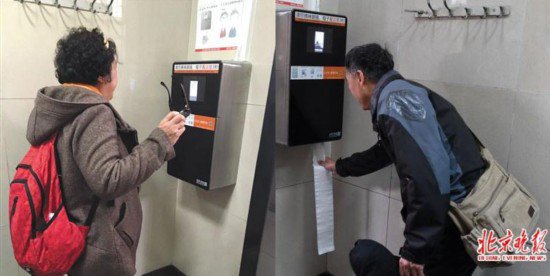
Anyone visiting a restroom at the capital city’s Temple of Heaven Park will now have their face scanned by a machine in a bid to prevent locals stealing the paper for use at home, The New York Times reported.
Toilet-paper theft has apparently become a serious issue in the city, with some tourists alarmed to discover dispensers empty of paper just when they need it most.
The high-tech machine, one of several set up around the popular tourist site this week, works by first grabbing a scan of your face via a built-in camera. Once it’s satisfied you’re not the same person who requested paper a moment earlier, it will dispense a strip of paper 2 feet long (about 60 cm). If you require more, you’ll need to wait a full nine minutes before you can use the machine again. Whether the new system leads to the more determined thieves donning masks or trying other forms of disguise in a bid to trick the technology into dispensing extra paper remains to be seen.
The marketing director of the company that created the machine told the Times that his engineers had “brainstormed many options” for the design, including “fingerprints, infrared and facial recognition.” He said they settled with facial recognition because “it’s the most hygienic way.’’
Many public restrooms in China’s cities have a single paper dispenser in a common area for everyone to use, but constant thieving has led some restroom operators to stop offering paper altogether.
The Temple of Heaven Park operator suggested the perpetrators are locals rather than tourists, with some slipping into the restroom on their way home from an early-morning tai chi session.
The new machines are part of a trial to see if facial recognition technology can help to prevent thieves from nabbing the paper. If successful, they’ll be set up inside other public facilities in the city, a move that should prove a huge relief — in every possible way — to restroom visitors desperate to answer the call of nature.
Editors' Recommendations
- Facial recognition tech for bears aims to keep humans safe
- Federal bill would ban corporate facial recognition without consent
- Facebook ordered to pay $650 million in facial recognition lawsuit
- ACLU files complaint against Detroit police for false facial recognition arrest
- Microsoft won’t sell facial recognition technology to police



